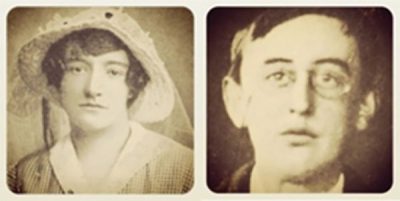Grace Gifford Plunkett: Wed and Widowed in Less Than a Day
Opinion Advocates for ideas and draws conclusions based on the author/producer’s interpretation of facts and data.
By Brian McGowan
Today we turn our sights on Grace Gifford Plunkett, who, while less prominent than those on our list thus far, can definitely lay claim to the title of saddest tale of all in the saddest of Irish times – the execution of the leaders of the 1916 Easter Rising.
Grace was the youngest in a solidly middle-class family of 12 children, with a Catholic father, Frederick Gifford, and a Protestant mother, Isabella Burton Gifford. It was an unusual match for the times. Grace and her sisters were baptized as Protestants; their brothers as Catholics.
Born in 1888, she showed great promise as an artist. At 16, she attended the prestigious Dublin Metropolitan School of Art. Her skills were recognized by William Orpen, a prominent artist of the time, who considered her one of his most outstanding students.

Caricature became her specialty. In 1913, she met Joseph Plunkett, avowed nationalist and editor of The Irish Review. His close friend and fellow revolutionary, Thomas MacDonagh, was already married to Muriel Gifford, Grace’s sister.
Gifford’s and Plunkett’s relationship soon blossomed. Engaged in 1915, Grace formally converted to Catholicism, and they set the date for their wedding to Easter Sunday, Apr. 23, 1916. Events would prevent that union from happening as scheduled, as the Irish Republican Brotherhood, in which both Plunkett and MacDonagh were senior members, pushed forward with plans for an armed uprising against the British, scheduled for Easter Monday, Apr. 24, 1916.
The Rising failed, and the ringleaders, including Plunkett, were rapidly bundled up by the authorities, court-martialed and sentenced to death by firing squad. On the website “Kilmainham Tales” (www.kilmainhamtales.ie), Joe Connell gives a wealth of information about what happened next.
It was May 3. MacDonagh, Grace’s brother-in-law, had been executed earlier that day. Plunkett’s sentence was scheduled to be carried out the next morning. Plunkett had somehow convinced the British authorities to grant him one favor, and had gotten word to Grace that he wished they could be married that night, before he met his fate. She purchased a ring at a jeweler on Dublin’s Grafton Street, and made her way to Kilmainham.
Plunkett, in ill health from a neck operation shortly before the Rising, was brought into a room where Grace was waiting. Uncuffed for the few moments that the ceremony took, they were married shortly before midnight by Fr. Eugene McCarthy of St. James’ Church. They had no opportunity for any intimacy, and were barely allowed to speak with one another before Grace was hurried off.
Early on the morning of May 4, she was allowed another visit with her husband.
“Ten minutes,” said the guard, who never left. That was the last she saw of Plunkett. He was shot by a firing squad about seven that morning.
Following Plunkett’s death, Grace threw herself into the rebel cause. She became active in the Sinn Féin (Ourselves Alone) party, advocated against the 1921 Treaty and found herself imprisoned at one point in Kilmainham by the Irish Free State during the Irish Civil War. The rest of her life was a struggle to survive on the meager earnings she made from her art. Lamentably, Plunkett’s parents gave her no support.
Her fortunes changed with the ascent of Eamonn DeValera to power in 1932, after which she received a pension that allowed her to survive. She died on Dec. 13, 1955, aged 67. She was buried with full military honors in Glasnevin Cemetery in Dublin. After Plunkett’s death, she never married again.
I was in Galway City recently and heard the ballad “Grace” sung at a local seisiún. Written in 1985 by Frank and Seán O’Meara, the song plaintively captures a poignant moment.
“Oh Grace, just hold me in your arms and let this moment linger,
They’ll take me out at dawn and I will die.
With all my love, I place this wedding ring upon your finger.
There won’t be time to share our love, for we must say good-bye.”
Longtime Pleasantville resident Brian McGowan was born and raised in the Bronx and is a second-, third- and fifth-generation Irish-American/Canadian, as his immigrant ancestors followed several paths to the New World. Reach him at brian.m.mcgowan1952@gmail.com. He is the author of two books, “Thunder at Noon,” about the Battle of Waterloo, and “Love, Son John,” about World War II. Both are available at Amazon.com.

Examiner Media – Keeping you informed with professionally-reported local news, features, and sports coverage.
